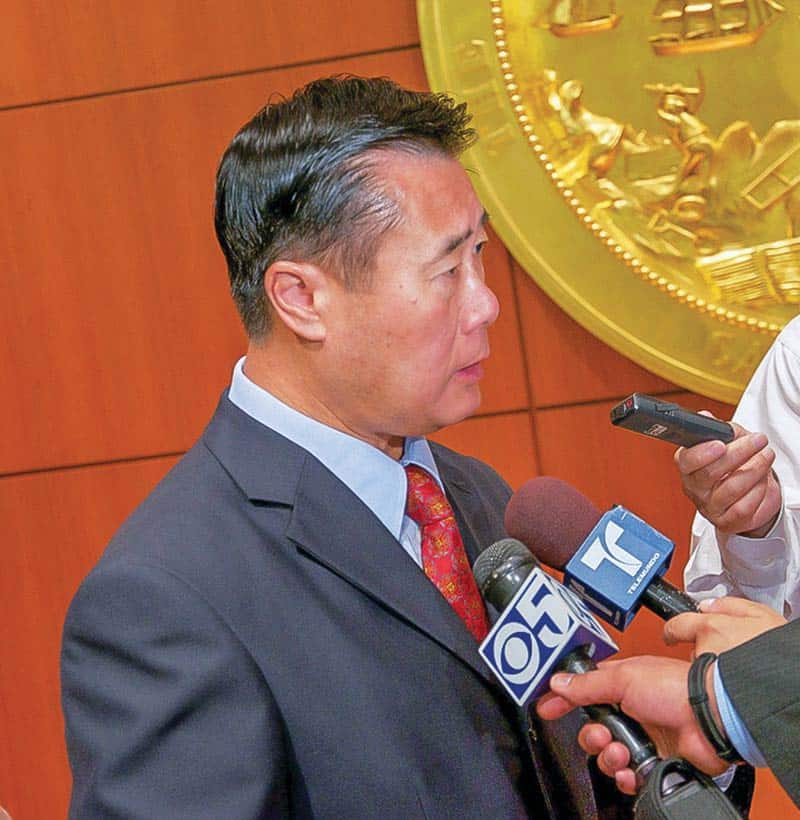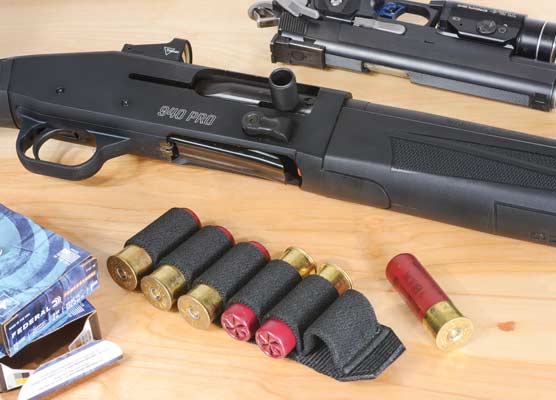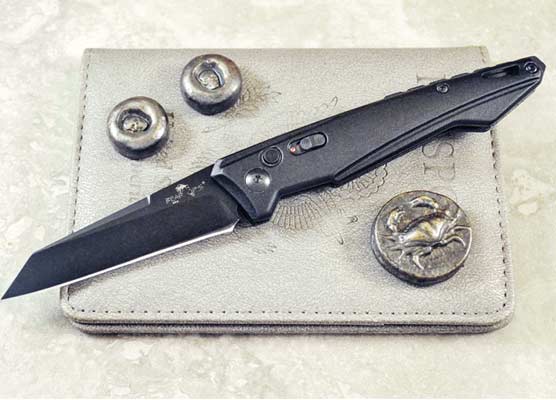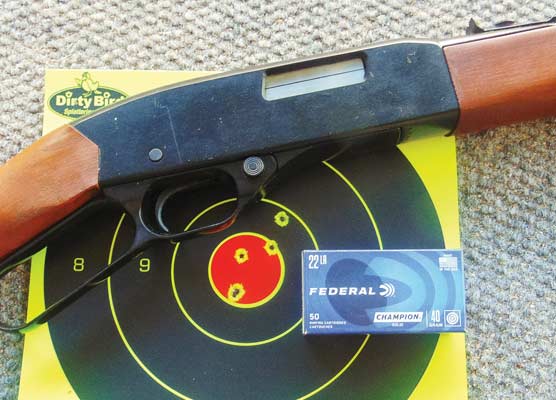Hypocrisy? Say It Ain’t So!
From Anti-Gunners To Reluctant Pols, it’s a ‘Class Act’
With the disclosure Chicago Alderman Ed Burke — described by the Windy City’s CBS affiliate as “a staunch supporter of gun control measures” — had a collection of 23 firearms he surrendered to federal investigators after being charged with extortion, many people seemed shocked.
The matter of Burke’s innocence or guilt will be decided by the legal system, but in the court of public opinion, he’s got some egg on his face.
Former California Senator Leland Yee. Photo: Steve Rhodes (CC)
No Surprises Here
The question should not be why Burke had all those guns, but why anyone is really surprised. Hypocrisy on guns is a well-established tradition in the United States, especially among gun control advocates. From the late Ted Kennedy’s bodyguard being arrested for bringing a gun into the Senate office building to celebrities who preach about banning guns while they enjoy armed security, the “guns for me but not for thee” separation-of-class principle remains alive and well.
Remember former California Senator Leland Yee, who supported virtually every gun control measure in Sacramento? He was jailed for being involved in a gun trafficking scheme to which he pleaded guilty. U.S. District Judge Charles Breyer chastised Yee as a hypocrite without integrity and then sent him to prison for five years.
The problem runs deeper than political hypocrisy, though. After the U.S. House under then-Speaker Paul Ryan passed national concealed carry reciprocity legislation in late 2017, the bill gathered dust in the Senate. Majority Leader Mitch
McConnell could have moved it, but he didn’t. Why not? The measure would have passed or failed, and gun owners would have been able to identify their real friends and foes on Capitol Hill.
Know Your Friends
Regardless of the reason for not taking up the reciprocity bill, millions of gun owners were left disappointed, and some felt betrayed. They voted for Republicans in 2016 to help restore the Second Amendment and the Beltway buckled.
It cannot happen again without consequences. Second Amendment voters will no longer cut any slack to a politician who says, “I support the Second Amendment, but…”
The U.S. Supreme Court issued two landmark Second Amendment rulings in the past 10 years (in 2008 and 2010), but has been noticeably leery about taking cases challenging restrictive state gun laws ever since. Why? Many in the firearms community believe it’s because the justices are reluctant to tamper with existing gun control laws which, while they have been in effect for years, may not stand constitutional muster under strict scrutiny.
One theory is the Court may realize it can really only rule one way on these restrictions, and it would be to nullify them all. It would remind state legislatures this is a fundamental right they have been tampering with, not a government-regulated privilege. But the Court, for whatever reason, is unwilling.
In their excellent Wall Street Journal analysis of the high court’s Second Amendment reluctance, Ilya Shapiro, director of the Cato Institute’s Robert A. Levy Center for Constitutional Studies and Matthew Larosiere, a legal associate with the center, noted the following:
“It’s high time for the court to begin making sense of Second Amendment law. That doesn’t mean making a sweeping judgment on ‘assault weapons,’ concealed carry, or anything else, but equipping the lower courts with the tools they need to decide cases consistently.” This is because most gun law is decided in the lower courts.
And they added this, a few lines later:
“It’s understandable for the Supreme Court to be wary of disrupting longstanding state laws, but the court has refused opportunities to clarify the way these laws are to be interpreted even in the narrowest situations … Justice Clarence Thomas derided the court’s continued resistance to clarifying the Second Amendment in his dissent from the denial in Silvester v. Becerra — Justice Neil Gorsuch joined him on a similar dissent in 2017 — pointing out the second-class treatment of the Second Amendment has encouraged the lower courts to codify their policy preferences.”
Chicago Alderman Ed Burke. Photo: Kate Gardiner (CC)
A Tactical Opportunity
Shapiro and Larosiere alluded to an interesting case which, at this writing, had just been submitted to the high court for possible review. It is known as Mance v. Whitaker, a challenge to the decades-old prohibition against licensed retailers selling handguns to residents from a different state.
The case was brought by the Citizens Committee for the Right to Keep and Bear Arms; unusual because CCRKBA typically does not involve itself in litigation, leaving it up to its sister organization, the Second Amendment Foundation. It was SAF that successfully brought the 2010 McDonald v. City of Chicago case to the high court, resulting in the incorporation of the Second Amendment to the states via the 14th Amendment.
SAF is providing financial support for the case, which is about a couple living in the District of Columbia being unable to purchase a handgun from a Texas-based firearms dealer. The prohibition against sales across state lines was adopted years before the advent of the National Instant Check System (NICS).
A Supreme Court ruling on this case, say the authors, “could provide a meaningful framework for evaluating Second Amendment cases without directly affecting any state law.”
Such a ruling might not upset the proverbial apple cart, but it just might break a few spokes in one wheel.
Who’s To Blame?
Americans seem to have this fixation with laying the blame for the current state of Second Amendment affairs. Some blame the National Rifle Association. Others blame the Nancy Pelosi/Chuck Schumer Democrats.
When it’s time to spread the blame, a look in the mirror might be appropriate. Too many gun owners take the Second Amendment for granted. They can be lethargic about voting, and doing the homework in preparation for the vote. Some are even willing to throw other gun owners and certain types of guns under the bus, which is another form of hypocrisy.
Elections matter, and proof of the pudding is found in the Oval Office, where Donald Trump is making lifetime federal court appointments, not Hillary Rodham Clinton.
While gun owners simply want to be left alone, gun prohibitionists aren’t inclined to leave them alone. For gun control fanatics, it’s the equivalent of a religion, and they practice it with fervor.
Gun politics has become a contact sport at which anti-gunners excel and too many gun owners are mediocre at best. It’s not enough to chest thump on social media or send an occasional $20 to the NRA and think you’ve done your part.
Time To Saddle Up
Take some lessons from the gun control crowd. They are constantly raising money for political fights down the road. If you belong to a local gun club, do not let a single meeting go by without passing around the hat, or better yet, a “Bucket of Bucks.” Talk to the promoters of local gun shows and ask them to solicit contributions for court or political fights, or to contribute to the NRA or SAF, which are currently the dominant players in gun rights litigation.
You’re out of options. If you want to protect your Second Amendment rights for generations to come, there must be more than just a token effort.
As Wyatt Earp reportedly told Ike Clanton after the shooting started one fine day in Tombstone, “The fight has now commenced. Go to fighting, or get away.”





